In the grand tradition of setting overly vague, essentially meaningless goals, one of mine for this past year was to "read more," which was not hard since apparently I read exactly 12 books in 2012. I may have failed to run even 1200 miles this year (thanks mostly to tearing my stupid hip flexor), but damned if I didn't finish 59 books--37 audiobooks, and 22 in hard copy.
(It turns out you can knock out a lot of audiobooks when you spend 2 hours a day in the car. I also listen to them when I'm out running, or doing stuff at work that doesn't require reading/writing/listening to people. So if you'd like to read more but don't have much time for reading books made out of paper, I can highly recommend getting an audible.com subscription & trading out some radio/music time for that.)
Here are my top pics:
For The Athlete:
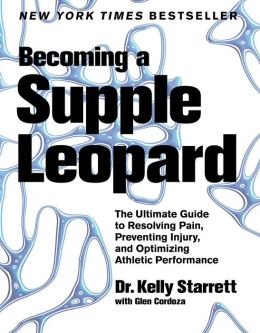 Becoming a Supple Leopard, by Kelly Starrett. Are you tired of being told that your aches / paints / injuries / etc. will go away if you "just do more yoga / strength work / stretch more"? Do you feel like you're just cobbling together a mix of common sense & pseudo-science & hoping for the best without any clear idea of what is *actually* causing your problems and what is *actually* likely to fix things? If so, you might at the very least find this book interesting. Starrett's philosophy is that “All human beings should be able to perform basic maintenance on themselves,” & that we shouldn't be at the mercy of doctors & PTs & trainers & whatnot to diagnose & fix every little ache & pain that comes up.
Becoming a Supple Leopard, by Kelly Starrett. Are you tired of being told that your aches / paints / injuries / etc. will go away if you "just do more yoga / strength work / stretch more"? Do you feel like you're just cobbling together a mix of common sense & pseudo-science & hoping for the best without any clear idea of what is *actually* causing your problems and what is *actually* likely to fix things? If so, you might at the very least find this book interesting. Starrett's philosophy is that “All human beings should be able to perform basic maintenance on themselves,” & that we shouldn't be at the mercy of doctors & PTs & trainers & whatnot to diagnose & fix every little ache & pain that comes up.
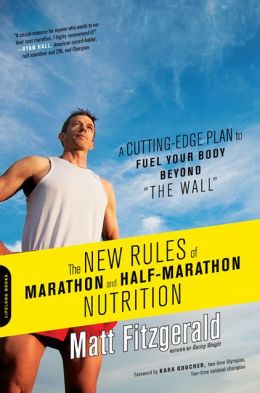 The New Rules of Marathon & Half-Marathon Nutrition, by Matt Fitzgerald. Probably the most useful & straightforward book I've ever read about nutrition specific to runners. Also, lots of great information that I hadn't seen before. Best of all, everything is based on current scientific evidence, not folk wisdom or outdated facts "everybody knows" from fifteen years ago. I doubt I will ever be even remotely perfect about my nutrition, but now I at least feel like I have a logical framework on which to hang my pitiful attempts.
The New Rules of Marathon & Half-Marathon Nutrition, by Matt Fitzgerald. Probably the most useful & straightforward book I've ever read about nutrition specific to runners. Also, lots of great information that I hadn't seen before. Best of all, everything is based on current scientific evidence, not folk wisdom or outdated facts "everybody knows" from fifteen years ago. I doubt I will ever be even remotely perfect about my nutrition, but now I at least feel like I have a logical framework on which to hang my pitiful attempts.
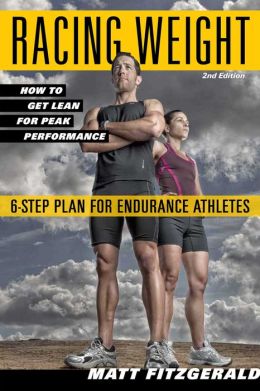 Racing Weight: How to Get Lean for Peak Performance, by Matt Fitzgerald. I first ran across this book a couple of years ago when I was looking for a solid, research-based, user-friendly primer on nutrition for endurance athletes, but dismissed it as probably too numbers-on-the-scale-focused for me. After reading The New Rules, though, I decided to give it a fair shot. Instead of telling you what weight to shoot for, he recommends first determining your body composition (% body fat), then setting an individualized goal. The rest of the book is chock full of science about how the bodies of endurance athletes process various nutrients, & tools for determining & improving the quality of your diet one step at a time.
Racing Weight: How to Get Lean for Peak Performance, by Matt Fitzgerald. I first ran across this book a couple of years ago when I was looking for a solid, research-based, user-friendly primer on nutrition for endurance athletes, but dismissed it as probably too numbers-on-the-scale-focused for me. After reading The New Rules, though, I decided to give it a fair shot. Instead of telling you what weight to shoot for, he recommends first determining your body composition (% body fat), then setting an individualized goal. The rest of the book is chock full of science about how the bodies of endurance athletes process various nutrients, & tools for determining & improving the quality of your diet one step at a time.
 The Sports Gene: Inside the Science of Extraordinary Athletic Performance, by David Epstein. Is extraordinary athletic performance a question of nature or nurture? Epstein assures us early in the book that it's 100% both. But how? Over sixteen chapters, he delves into a wide range of issues related to athletic performance and genetics, including the role of practice, sex & hormone differences, "trainability", body type, geography, ancestry, injury & disease, pain tolerance, and will power. (The chapter on breeding champion sled dogs for work ethic instead of speed was particularly interesting.) The upshot: there is no simple answer, but the topic is utterly fascination.
The Sports Gene: Inside the Science of Extraordinary Athletic Performance, by David Epstein. Is extraordinary athletic performance a question of nature or nurture? Epstein assures us early in the book that it's 100% both. But how? Over sixteen chapters, he delves into a wide range of issues related to athletic performance and genetics, including the role of practice, sex & hormone differences, "trainability", body type, geography, ancestry, injury & disease, pain tolerance, and will power. (The chapter on breeding champion sled dogs for work ethic instead of speed was particularly interesting.) The upshot: there is no simple answer, but the topic is utterly fascination.
Fiction:
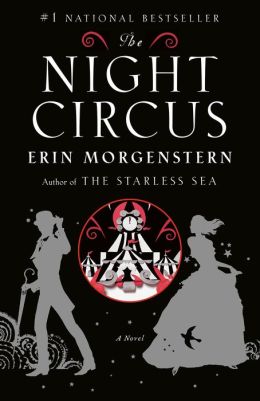 The Night Circus, by Erin Morganstern. Without giving away too much plot, this book struck me as Ray Bradbury-meets-Catherynne M. Valente -- beautifully poetic writing, descriptions that appeal to all of the senses, & nostalgic imagery, with a plot that is a sort of modern (well; late 19th century) fairy tale. The characters are carefully crafted and their relationships & interactions are believable and convincing while also subverting your expectations just enough to feel original & refreshing. It's so rare that a love story doesn't make me want to throw up a little, & Celia maybe the best written heroine I have read in a long, long time. I almost couldn't put this book down & that almost never happens to me.
The Night Circus, by Erin Morganstern. Without giving away too much plot, this book struck me as Ray Bradbury-meets-Catherynne M. Valente -- beautifully poetic writing, descriptions that appeal to all of the senses, & nostalgic imagery, with a plot that is a sort of modern (well; late 19th century) fairy tale. The characters are carefully crafted and their relationships & interactions are believable and convincing while also subverting your expectations just enough to feel original & refreshing. It's so rare that a love story doesn't make me want to throw up a little, & Celia maybe the best written heroine I have read in a long, long time. I almost couldn't put this book down & that almost never happens to me.
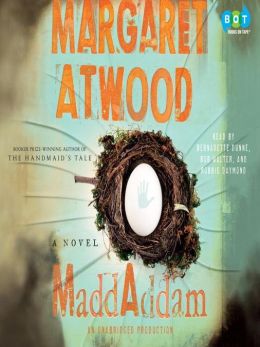 The MaddAddam Trilogy, by Margaret Atwood. (Okay, I am cheating a little because this is actually three books.) Wow. Wow, wow, wow (one for each book--Oryx & Crake, The Year of the Flood, and MaddAddam). If you are a Margaret Atwood fan, get thee to a library / bookstore / kindle / whatever post haste--this is probably her best work yet. If you are not a Margaret Atwood fan, how are you not a Margaret Atwood fan???? I don't often do post-apocalyptic sci-fi, but if someone was going to spin a completely original and unique yarn in that genre full of dynamic and interesting characters and masterful writing and straight-up nail it first time out of the gate, I'm not surprised it was her. Fantastic. Could not put it down.
The MaddAddam Trilogy, by Margaret Atwood. (Okay, I am cheating a little because this is actually three books.) Wow. Wow, wow, wow (one for each book--Oryx & Crake, The Year of the Flood, and MaddAddam). If you are a Margaret Atwood fan, get thee to a library / bookstore / kindle / whatever post haste--this is probably her best work yet. If you are not a Margaret Atwood fan, how are you not a Margaret Atwood fan???? I don't often do post-apocalyptic sci-fi, but if someone was going to spin a completely original and unique yarn in that genre full of dynamic and interesting characters and masterful writing and straight-up nail it first time out of the gate, I'm not surprised it was her. Fantastic. Could not put it down.
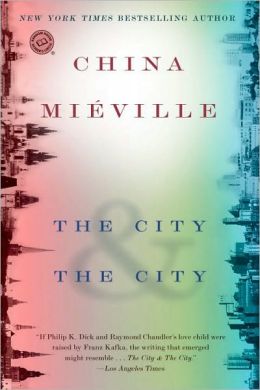 The City and the City, by China Miéville. This book definitely gets props for one of the most unique and interesting premises I can remember. Imagine two cities which occupy the same physical space--ie, some geographical areas are part of one city, others are part of the other, some areas are sort of "cross-hashed" over each other, and some areas exist in both. Also imagine that interacting with or even acknowledging something or someone who is in the other city--even if they are standing right next to you--is the worst crime that exists. Now imagine trying to carry out a murder investigation in one of those cities. A gripping and completely unpredictable story, thanks to the mind-blowing premise & fantastic writing.
The City and the City, by China Miéville. This book definitely gets props for one of the most unique and interesting premises I can remember. Imagine two cities which occupy the same physical space--ie, some geographical areas are part of one city, others are part of the other, some areas are sort of "cross-hashed" over each other, and some areas exist in both. Also imagine that interacting with or even acknowledging something or someone who is in the other city--even if they are standing right next to you--is the worst crime that exists. Now imagine trying to carry out a murder investigation in one of those cities. A gripping and completely unpredictable story, thanks to the mind-blowing premise & fantastic writing.
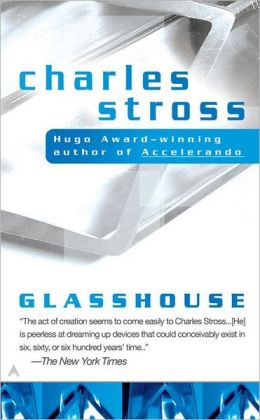 Glasshouse, by Charles Stross. It took me a couple of chapters to get into "Glasshouse", but once the main story got going, it was interesting, creative, full of dynamic & believable characters, and actually really funny at times. In order to hide from whoever is trying to kill him, Robin agrees to be part of a sociology experiment where people agree to be put into "ancient"--late 20th century--bodies & live "as the ancients" for a few years so that researchers can see how social interactions & relationships worked. Before the serious stuff goes down, this made for much hilarity without seeming like a gag. Perfect if you want a bit of fun, engaging, interesting, well-written, not-too-creepy-&-weird sci-fi without a serious commitment.
Glasshouse, by Charles Stross. It took me a couple of chapters to get into "Glasshouse", but once the main story got going, it was interesting, creative, full of dynamic & believable characters, and actually really funny at times. In order to hide from whoever is trying to kill him, Robin agrees to be part of a sociology experiment where people agree to be put into "ancient"--late 20th century--bodies & live "as the ancients" for a few years so that researchers can see how social interactions & relationships worked. Before the serious stuff goes down, this made for much hilarity without seeming like a gag. Perfect if you want a bit of fun, engaging, interesting, well-written, not-too-creepy-&-weird sci-fi without a serious commitment.
Nonfiction:
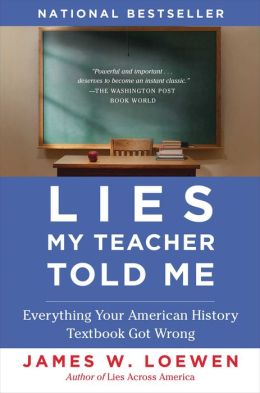 Lies My Teacher Told Me : Everything Your American History Textbook Got Wrong, by James W. Loewen.For all that I've generally been aware that US history as it gets taught in school is pretty sterilized and white-washed, until I read this book, I didn't realize the extent to which it was patently falsified (including falsification by selective omission). I lost track of the times over the course of reading this book where I found myself going, "Wait, what????" & backtracking to be sure that I'd actually read what I thought I'd just read. All the inaccuracies & omissions Loewen discusses are backed by primary sources & fully documented, and he invites you to delve deeper & do your own research if you feel disinclined to take him & his sources at their word.
Lies My Teacher Told Me : Everything Your American History Textbook Got Wrong, by James W. Loewen.For all that I've generally been aware that US history as it gets taught in school is pretty sterilized and white-washed, until I read this book, I didn't realize the extent to which it was patently falsified (including falsification by selective omission). I lost track of the times over the course of reading this book where I found myself going, "Wait, what????" & backtracking to be sure that I'd actually read what I thought I'd just read. All the inaccuracies & omissions Loewen discusses are backed by primary sources & fully documented, and he invites you to delve deeper & do your own research if you feel disinclined to take him & his sources at their word.
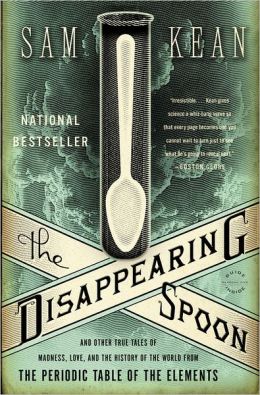 The Disappearing Spoon: And Other True Tales of Madness, Love, and the History of the World from the Periodic Table of the Elements, by Sam Kean. You might like this book if you 1) enjoy amusing stories about science told with a historical/human interest angle (RadioLab fans, I'm looking at you); 2) knew your chemistry at some point & would kind of like a refresher of the basics, but hate textbooks; 3) are curious about chemistry/particle physics but find terms like "covalence electrons" and "ionic bonds" kind of intimidating; 4) are a young person who has not yet studied chemistry formally (I could totally see this book turning a "fuzzy" on to science); 5) enjoy unconventional histories various & sundry. Entertaining & well-written!
The Disappearing Spoon: And Other True Tales of Madness, Love, and the History of the World from the Periodic Table of the Elements, by Sam Kean. You might like this book if you 1) enjoy amusing stories about science told with a historical/human interest angle (RadioLab fans, I'm looking at you); 2) knew your chemistry at some point & would kind of like a refresher of the basics, but hate textbooks; 3) are curious about chemistry/particle physics but find terms like "covalence electrons" and "ionic bonds" kind of intimidating; 4) are a young person who has not yet studied chemistry formally (I could totally see this book turning a "fuzzy" on to science); 5) enjoy unconventional histories various & sundry. Entertaining & well-written!
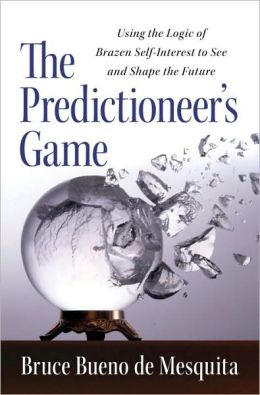 The Predictioneer's Game: Using the Logic of Brazen Self-Interest to See and Shape the Future, by Bruce Bueno De Mesquita In this book, the author--a political scientist--discusses how he's spent the last thirty-some-odd years harnessing the power of math & logic (in the form of game theory) to make spookily accurate predictions about business, politics, legal battles, & all kinds of other situations that involve human beings negotiating and scheming for the best possible outcome. And these aren't fields in which he has special expertise or privileged information--as he reminds us over and over and over again, humans who want things are predictable, which means their behavior can be modeled mathematically. Impossible, you say? That must be why Bueno De Mesquita's predictions have something like a 90% success rate.
The Predictioneer's Game: Using the Logic of Brazen Self-Interest to See and Shape the Future, by Bruce Bueno De Mesquita In this book, the author--a political scientist--discusses how he's spent the last thirty-some-odd years harnessing the power of math & logic (in the form of game theory) to make spookily accurate predictions about business, politics, legal battles, & all kinds of other situations that involve human beings negotiating and scheming for the best possible outcome. And these aren't fields in which he has special expertise or privileged information--as he reminds us over and over and over again, humans who want things are predictable, which means their behavior can be modeled mathematically. Impossible, you say? That must be why Bueno De Mesquita's predictions have something like a 90% success rate.
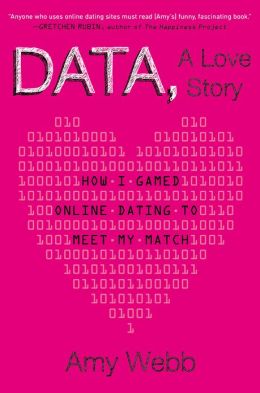 Data, A Love Story: How I Gamed Online Dating to Meet My Match, by Amy Webb. After months of truly horrific online dating & feeling pressured by her mother's terminal illness to find a life partner as soon as possible, newly 30 Amy Webb threw herself into "hacking" J-date using an awe-inspiring level of math, science, and color-coded spreadsheets. The topic may sound superficial, but if you are at all a mathy-codey-hacky-data-loving type of person, you very well may find a lot of her story fascinating. Absolutely, online daters will probably find it even more interesting (and informative), but I enjoyed it purely based on its existence at the weird intersection of statistics & sociology.
Data, A Love Story: How I Gamed Online Dating to Meet My Match, by Amy Webb. After months of truly horrific online dating & feeling pressured by her mother's terminal illness to find a life partner as soon as possible, newly 30 Amy Webb threw herself into "hacking" J-date using an awe-inspiring level of math, science, and color-coded spreadsheets. The topic may sound superficial, but if you are at all a mathy-codey-hacky-data-loving type of person, you very well may find a lot of her story fascinating. Absolutely, online daters will probably find it even more interesting (and informative), but I enjoyed it purely based on its existence at the weird intersection of statistics & sociology.
If you want to get more book recommendations from me, follow me on GoodReads! I rate & review just about everything I read.
Read any amazing books this year? What else must I not miss??













 Whenever the topic of fantasy, particular 'high' fantasy or 'epic' fantasy or whatever term you want to use for books involving feudalism and swordplay and wizards and stew, is raised, I general tend to plant myself firmly in the "meh-not-really-my-bag" camp. (This in spite of the fact that GoodReads would have me believe I've read more fantasy than anything else.) Not because I'm concerned about getting labeled as one of *those* people (you know the stigma I'm referring to), but because in my experience, people who are into high fantasy are REALLY into high fantasy, and frankly just not always that discriminating about, like, plot and characters & stuff. There is just so, so much fantasy out there that is so, *so* unbelievably bad.
Whenever the topic of fantasy, particular 'high' fantasy or 'epic' fantasy or whatever term you want to use for books involving feudalism and swordplay and wizards and stew, is raised, I general tend to plant myself firmly in the "meh-not-really-my-bag" camp. (This in spite of the fact that GoodReads would have me believe I've read more fantasy than anything else.) Not because I'm concerned about getting labeled as one of *those* people (you know the stigma I'm referring to), but because in my experience, people who are into high fantasy are REALLY into high fantasy, and frankly just not always that discriminating about, like, plot and characters & stuff. There is just so, so much fantasy out there that is so, *so* unbelievably bad.